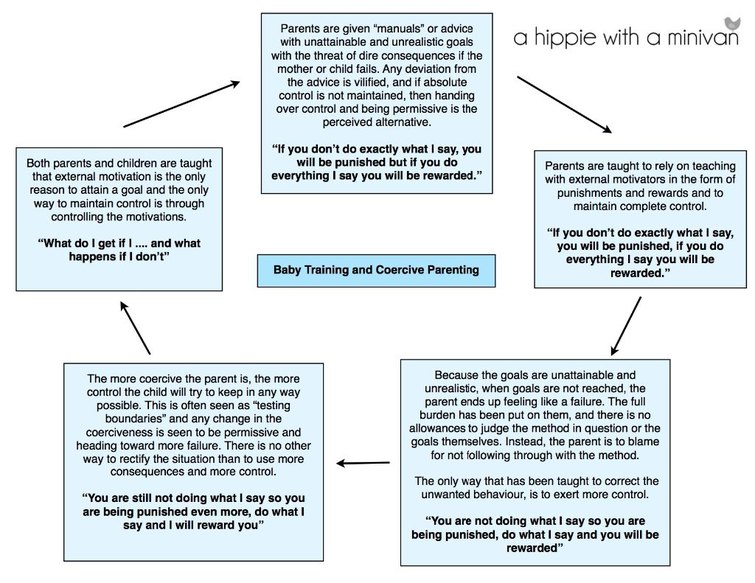I saw this article linked to Facebook this morning…
Research shows 50 years of motherhood manuals set standards too high for new mums
New research at the University of Warwick into 50 years of motherhood manuals has revealed how despite their differences they have always issued advice as orders and set unattainably high standards for new mums and babies.
……
“Dr Davis found although the advice from these experts changed over the decades, the one thing that didn’t change was the way it was delivered. Whatever the message for mothers, it was given as an order with a threat of dire consequences if mother or child failed to behave as expected.”
“Dr Davis said: “Despite all the differences in advice advocated by these childcare ‘bibles’ over the years, it is interesting that they all have striking similarities in terms of how the experts presented their advice. Whatever the message, the advice was given in the form of an order and the authors highlighted extreme consequences if mothers did not follow the methods of childrearing that they advocated.”
“Levels of behaviour these childcare manuals set for mothers and babies are often unattainably high, meaning women could be left feeling like failures when these targets were not achieved. Therefore while women could find supportive messages within childcare literature, some also found the advice more troubling.”
This article was shared by a group on Facebook that is against “Baby Training” in the form of sleep training such as CIO (cry-it-out) or controlled crying. And I completely agree with them that part of the focus of the article is to show that so many parents are coerced into trying to achieve unattainable standards when it comes to children’s sleep that goes against what is biologically and physiologically normal. I could go on and on about why controlled crying is harmful including the changes in cortisol levels and the long term effects on stress but I think that a previous article by Dr. Gabor Maté sums it up perfectly…
People cannot consciously recall what they “learned” in the first year of life, because the brain structures that store narrative memory are not yet developed. But neuropsychological research has established that human beings have a far more powerful memory system imprinted in their nervous systems called intrinsic memory. Intrinsic memory encodes the emotional aspects of early experience, mostly in the prefrontal lobe of the brain. These emotional memories may last a lifetime. Without any recall of the events that originally encoded them, they serve as a template for how we perceive the world and how we react to later occurrences.
Is the world a friendly and nurturing place, or an indifferent or even hostile one? Can we trust other human beings to recognize, understand and honour our needs, or do we have to shut down emotionally to protect ourselves from feeling vulnerable? These are fundamental questions that we resolve largely with our implicit memory system rather than with our conscious minds. As psychologist and leading memory researcher Daniel Schacter has written, intrinsic memory is active “when people are influenced by past experience without any awareness that they are remembering.”
The implicit message an infant receives from having her cries ignored is that the world — as represented by her caregivers — is indifferent to her feelings. That is not at all what loving parents intend.
Unfortunately, it’s not parental intentions that a baby integrates into her world view, but how parents respond to her. This is why, if I could relive my life, I would do much of my parenting differently.
However, the baby training aspect was not exactly the first thing that came to mind when I find started reading the article.
The first thing that came to mind was how much it shows that the cycle of coercion is being perpetuated; from the authority of the book (or people giving advice), to the authority of the parent, to the focus on punishment and reward to keep control, to learning to make decisions because of external motivation and in doing so, continuing that cycle of control and coercion.
This cycle keeps coming up in parenting circles and discussions. It is the stern “reality” that if you are not “in control” then you are permissive and being controlled.
There is no middle ground and no alternatives. Everyone knows that babies and children are master manipulators and are masters of controlling so you can’t let your guard down for a second. You have to be in control. The parents that don’t use punishments or rewards are just letting their kids run wild and walk all over them and they will never to do things because internal motivation just doesn’t happen. Kids have to “learn” and the parents will have a “wake up call” down the road when they kid is doing whatever they please, jobless or even in jail because they never learned how things work “in the real world”. (I wish I was exaggerating, but I have seen all of these said in parenting threads… even just yesterday)
But I “get” it… the ideas that these parents have comes from this cycle. The whole tone of these parenting methods is by using rewards and punishments and warning that any deviations from the method will be punished. If you don’t listen to the authority and exert control, your baby won’t sleep, your toddler won’t learn to not run into the street and will get hit by a car, your child will disobey and become a delinquent and people will hate them and look down at you as the parent for failing to do the “right” thing. Following the rules of the book and the authority will in turn create “good kids”.
The parent’s behaviour is being controlled by the very ideology of punishment and reward and they are in turn is teaching the same to their children.
The problem though is that following the rules, especially when goals are actually unattainable, is that the parents and children are doomed for failure. Parents end up needing to step it up a notch to be more in control and are forced to choose between doing what they are told and doing what feels right.
I have never heard someone say that it feels right to make their baby cry itself to sleep. They say that it just needs to be done. They are taught that there is no other way, and are led to believe that these behaviours are not normal. The fact is that it is completely normal, but to admit to it or relent control is the equivalent of defeat.
The thing about this cycle is that if someone breaks it, they actually have to have a whole paradigm shift. It is a completely different way of seeing things when you start trusting in yourself and trusting that children will thrive and succeed without being controlled. It also means that we must be able and willing to accept and forgive ourselves for the choices they we may have made in the past that have had negative effects. It is easy to become defensive and say that it didn’t happen, or minimize the effects, but it is not constructive to do so.
It is time that we stop this cycle.
If there is anything that we wish to change in the child,
we should first examine it and see whether it is not something that could better be changed in ourselves.
~C.G. Jung
Continue to read: Discipline and How Non-Punitive Parenting Works





Thanks so much for this post Melissa! I’m so new at this parenting thing, but I definitely agree with many of your points, and I’m so grateful for blogs like yours that are helping me find my way. My girl is 18 months old now, and I’ve found that many situations that result in her “misbehaving” are often the result of a lack of understanding on my part. Like during her bath tonight, she filled a cup with water and then poured it out over the side of the tub. Kind of inevitable behavior for an 18 month old, I should probably wait a bit before I let her have cups in the tub…I’m always surprised when I see a mom freak out at her toddler in Target for getting upset while she completes her insanely long list. What toddler wants to be stuck in a shopping cart in the store more than a few minutes? You really can’t blame them, when I was a kid 20 minutes seemed like an eternity!
I like the idea of creating a “yes” environment where she can roam and play at will and putting those things out of reach, etc. that are dangerous/breakable/expensive.
Here’s my question though since I’m not there yet. What do you do when they ARE old enough to understand but willfully misbehave? Like, when she’s four and decides to pour out the cup of water over the edge of the tub (or worse!).
Ah… water messes in the bath… even my older kids have that problem! Annoying and messy isn’t it? However, I don’t think it has anything to do about willfully misbehaving. I think it is more that they just don’t think of the mess that will happen…
What do we do? We point out to them what is happening… “did you notice that water is going on the floor and making a mess?”
Then provide a solution like… “How about you do that in the corner next to the wall?”
We also either ask them to clean up the water with a towel or just put a towel over the mess ourselves.
If water messes are happening too much then we ask them to stop that game or just say that it is time to get out of the bath…
I agree
Lots of ‘misbehaving’ is just experimenting and doing things without seeing the consequences of these actions for themselves or other people.
The natural consequence of pouring water out of the bath is that someone else will slip on it or it will damage the floor so you have to get out of the bath to dry it up to stop those things happening.
? love your your mentality about parenting, ? definitely learned a lot from your blog. For instance my son Beren is 3 years old and ? am still breastfeeding despite everyone except my husband. Of course he came into terms after so many explanations from my side and eventually one night he watched a documentary on tv about breastfeeding and learned there is really not a solid reason why the Western medicine recommends 2 years as the maximum breastfeeding duration.
? never cried out Beren for sleep. ? never push him for anything, there is no reward or punishment system in our house. Eventhough we have never met, ? live on the other side of the world, your impact on my parenting is more than anyone around me. You made me realize that my inner voice about my parenting is the only real source ? should trust. And my living proof is my son, he became such a lovely, independent, caring, clever boy. Thanks a lot for this blog.
Sorry for the ‘?’, as understood they stand for ‘i’.
I found my way here through your comments on an article in HuffPo. I thought you might be interested in an organization based here in Los Angeles called Echo Parenting and Education (formerly the Center for Nonviolence in Education and Parenting) which teaches an empathy led practice of parenting. I find the fact that although we have learned so much about brain development in the last 10-15 years, the need for compliance and obedience from our children remain a priority over emotional connection – something we know is essential to optimal brain development – and that the destructive means of acquiring compliance (spanking, time outs, rewards, etc.) persist. The fact that the author of the HuffPo article was praising It’s Magic 1-2-3 is discouraging and a bit horrifying. Thanks for your thoughtful comments! http://www.echoparenting.org
Hi,
I also found my way here through your comments on the HuffPo article. And I like your website, great work 🙂
There is another group in California too you might be very interested in: HandinHandParenting.org
They have a fantastic model of helping parents focus on emotional connection with children, with a main focus being that children’s behavior gets “offtrack” when they are feeling emotionally disconnected from the parent or when something has restimulated an unfinished emotional project for them. And that when kids’ behavior is “offtrack” it’s because they are caught in their limbic system (non-rational thinking part of mind) and really can’t be expected to think about their behavior or talk about it or learn anything really. What they really need to get back on-track and be able to think clearly and learn is to have an adult offer them warm, supportive listening until the emotions have settled.
The great thing about this parenting model is that it really emphasizes ways that parents can connect with other parents or friends/family through listening partnerships to offload their own emotions about how hard it is to parent when our kids behavior is “offtrack” in some way. This lets parents get a chance to heal their emotions in order to be more clear-thinking when emotions swell up in their kids.
Anyway, I just love their work, and thought you might enjoy checking them out too, lots of great articles and resources on developing non-aggressive, non-harsh responses to our kids behaviors.
[…] This is in part a continuation of the post “High standards and the cycle of coercive parenting…” […]
Melissa you are wonderful! Hi my name is Jenna, I am married with no kids… yet. I have been on the fence in regards to child discipline until following your link from FB’s ‘A Hippie Mom in Conservative Clothing’ post. I can’t say I didn’t turn out well being raised on the traditional model of child discipline, but there were definitely hardships in my 25 years leading to this point, now, of understanding, belief, and realisation. I have seen so many great examples with my friends these days, and my parents’ friends many years ago, who were attachment focused and non-punitive. The kids turned out to be very very clever as well as healthy and well adjusted. That feels like enough proof to me, along with the ideas you explore here. My husband is a teacher and learns every day from his students about so called control in the classroom. He is only one year in, and is about to sit an interview with a Catholic school (we arent religious) that focuses much more heavily on restoration and prevention and healing, than conventional discipline. I hope he gets the job and learns even more, and I through him.
My next topic may seem unrelated but I don’t believe it is. It feels like every day I talk to someone, an adult, who has accepted in a trusting way, and some who have a hard time accepting, their mental illness. You don’t make this specific point, but allude to what happens down the track, and the fear of delinquency. Maybe it is a bold statement, but having been diagnosed as having bipolar… I struggled and reacted very emotionally and defiantly to these negative behaviour concepts soon after highschool, and then eventually knew instinctively pharma drugs would not help… 6 years later I am still haunted by how many of my adult friends have had similar experiences and still suffer. What if? It’s a big what if. BUT. What if their parents… and my parents… had used your non-punitive approach? Would we have seen a generation of happier, more loving, more trusting individuals? It is time that we stop this cycle.
I guess I am fishing for a response. My grandmother helped very much in raising us and looking after us to give my parents time alone together. I want my parents to be involved and able to take care of my children for visits, and my husbands parents as well.
My question is how do I (how would you?) clearly explain my expectations to them in how to interact with my children, when we do have them down the line? I fear not being clear enough verbally and they might resort to what is easy when alone with my children.